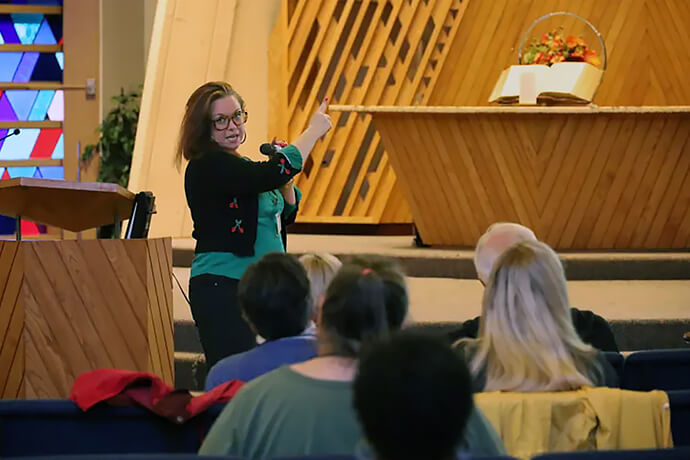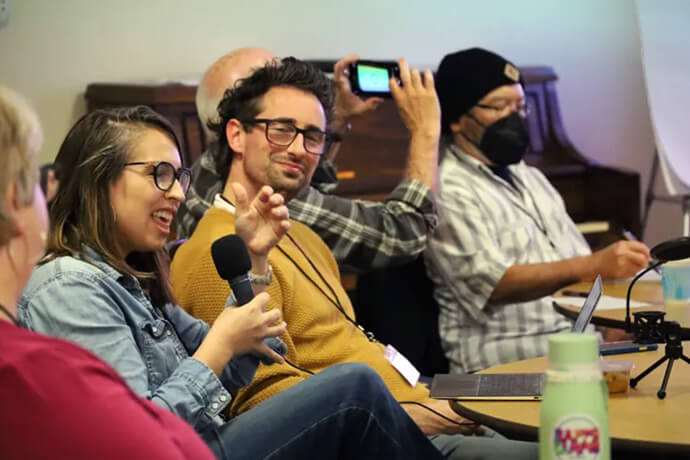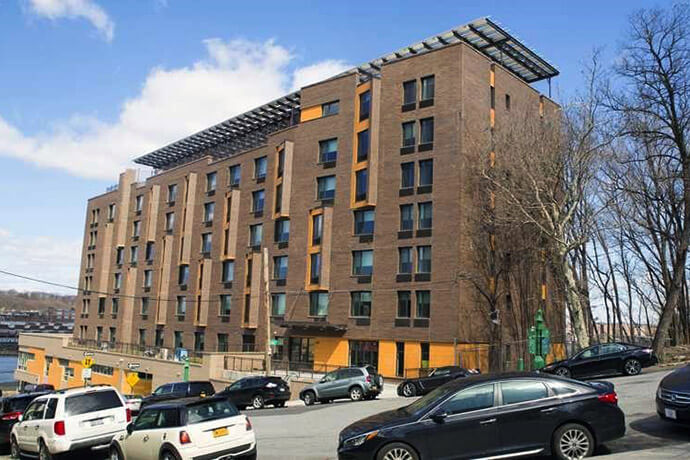Key points:
- The U.S. Supreme Court, in a 6-3 decision, upheld an Oregon city’s ordinances that make sleeping in public places a crime.
- United Methodists see reason to increase their efforts to care for the homeless and build affordable housing on church land.
- The Greater Northwest Area, which includes the city where the Supreme Court case originated, has made equitable housing a ministry focus.
For many United Methodists who minister with homeless people, a U.S. Supreme Court ruling that allows cities to outlaw sleeping in public places is both a cause for alarm and call to action.
“Criminalizing homelessness is always a problem,” said the Rev. Julia Nielsen, a United Methodist and director of organizing for the ecumenical Leaven Community Land and Housing Coalition based in Portland, Oregon.
“We want to be alongside folks and not stand against them,” she said, “and so this is really disturbing news.”
By a vote of 6-3, the U.S. Supreme Court upheld ordinances in the southwest Oregon town of Grants Pass that forbid homeless people from camping in public places. The majority ruled that the ordinances do not violate the Eighth Amendment’s ban on “cruel and unusual punishment.”
“Homelessness is complex. Its causes are many. So may be the public policy responses required to address it,” Justice Neil Gorsuch wrote for the majority in the City of Grants Pass v. Johnson.
He added that “a handful of federal judges” cannot match “the collective wisdom the American people possess in deciding ‘how best to handle’ a pressing social question like homelessness.”
Justice Sonia Sotomayor wrote the dissent in an opinion joined by Justices Elena Kagan and Ketanji Brown Jackson.
Sotomayor wrote that the court has a role to play “in faithfully enforcing the Constitution to prohibit punishing the very existence of those without shelter.”
She added that she remains hopeful that “someday in the near future, this Court will play its role in safeguarding constitutional liberties for the most vulnerable among us. Because the Court today abdicates that role, I respectfully dissent.”

The June 28 decision will likely have impact well beyond southwest Oregon, with more municipalities across the U.S. considering similar camping bans even when shelter space is unavailable.
The U.S. Department of Housing and Urban Development reported that more than 650,000 people were experiencing homelessness on a single night in January 2023, a 12% increase from 2022.
Advocates agree that a major contributor to the rise in homelessness — and the resulting anti-camping measures — is a lack of affordable housing. Demographers estimate that Oregon alone needs 110,000 more housing units right now just to meet current demand.
Put another way, the United States has a problem with homelessness because it does not have enough places where people can sleep with a roof over their heads.
Some 30 years before the current court case, Wespath — The United Methodist Church’s pension and benefits agency — initiated the Wespath’s Positive Social Purpose Lending Program to help address this problem. The program invests in loans that support affordable housing and community development.
Since 1990, the program has invested more than $2 billion in U.S. affordable housing, creating or preserving over 52,000 units total in all 50 states. The program also invests in community facilities that serve low- and moderate-income people, including transitional shelters for the homeless and health care centers. The people who invest with Wespath, including United Methodist clergy and institutional investors, help make these investments possible.
But United Methodist churches and other faith communities also can step up, said Nielsen, the housing coalition organizer. She pointed out that many churches have unused land as well as the biblical call to care for the poor.
“Given the fact that we have so much land wealth and so many relationships in our communities in many places, we also have a responsibility to take on the duty of building affordable housing,” she said. “And we have the opportunity to do that because we do have the land resources.”

The Leaven Community Land and Housing Coalition works with faith communities with the goal that everyone in Oregon will have a place to call home. Nielsen has written an e-book, Discerning Whether Your Faith Community Should Build Affordable Housing.
She said the ecumenical work on housing among Portland-area United Methodists, Lutherans, Episcopalians and others goes back about a decade. The housing coalition worked with other advocates to successfully lobby Portland city leaders in 2019 to change zoning regulations so houses of worship could build affordable housing on their property.
Last year, the coalition also was part of the effort that led the state to include $9.7 million in the state budget to award grants for some predevelopment costs. That is in addition to the $200 million legislative package — that the coalition supported and also passed last year — to fund rent assistance, eviction prevention and housing shelter expansions in Oregon.
Subscribe to our
e-newsletter
Bishop Cedrick Bridgeforth, whose area includes Oregon, has also designated housing as a “ministry that matters” for the entire episcopal area he leads. The Greater Northwest Area, which the bishop has led since January 2023, spans more than 400 United Methodist churches in Oregon, Idaho, Washington, Alaska and parts of Canada’s British Columbia.
In November last year, the bishop helped organize the Housing God’s Beloved summit at Parkrose United Methodist Church in Portland to train United Methodists on housing issues. Nielsen was one of the speakers at the event.
“Criminalized poverty is antithetical to the gospel lived by Jesus. In the Greater Northwest Episcopal Area, inclusive of Grants Pass, we will double down on our commitment to house God's beloved,” Bridgeforth said. “We will seek the welfare of the cities to which we are called.”
Bridgeforth also has appointed the Rev. Brett Pinder as the area’s missional strategist for housing ministries that matter.
Pinder said the Supreme Court’s ruling “is cruel and it only serves to create more barriers and pressures working against people experiencing houselessness.”
However, he sees many United Methodists across the Greater Northwest Area now focused on equitable housing. He added that his role is to walk with congregations to help them discern what their ministry might be.
“For some churches this looks like stewarding their land to become affordable housing; for some it looks like fundraising; for some this looks like local advocacy,” he said.
The Greater Northwest Area already has a number of projects in various stages. Last year, Portsmouth Union Church in Portland opened a 20-unit affordable apartment complex for veterans and their families. While the church has shut its doors as a house of worship, the Oregon-Idaho Conference has committed to maintaining the complex.
This past April, Christ United Methodist Church in Cedar Mill, on the west edge of Portland, held the grand opening of The Opal, a 54-unit complex serving the needs of LGBTQ seniors.
Beyond housing construction, Pinder said, the Grants Pass ordinances and the Supreme Court ruling demonstrate the need for advocacy.
“There is need for people whose faith includes hope for justice and equity to use our voice at various levels of governing institutions,” he said.

Grants Pass is a city of just under 40,000 people that has as many as 600 people experiencing homelessness on any given night. The city, not far from the California border, is about 245 miles south of Portland.
The city only has one homeless shelter, which is more of a transitional housing program that also has strict religious requirements. Grants Pass’ ordinances impose criminal penalties of a $1,250 fine and up to 30 days in jail on homeless individuals who use blankets, pillows or cardboard boxes for protection from the elements while sleeping in public spaces within the city limits. The ban on blankets, Sotomayor’s dissent said, could apply even to people sleeping in their own cars.
Connie Sagara, a member of Newman United Methodist Church in Grants Pass and registered nurse, volunteers with a nonprofit group that works with the community’s homeless population. She said most of the people she works with are disabled and/or elderly.
The nonprofit — the Mobile Integrative Navigation Team or MINT for short — is raising funds for a structure that can serve as a warming or cooling shelter, depending on the season. Behind the shelter, the nonprofit plans to add 15 tiny homes for the elderly and disabled to have a place of their own.
But currently she said the group is mainly working with people who spend most of their days in the city’s two parks. With the permission of local law enforcement, Sagara and other nonprofits help the people move between the parks every three days so they can avoid citations.
“I don’t know what’s going to happen with this decision,” Sagara said. “I think Grants Pass was shamed pretty bad during all the press. I’m praying, and we’re hoping, that they will step up and maybe create an area for people to go.”
In the meantime, she says all she can do is try to help the vulnerable people in her community.
“I feel like if I truly love God, God wants me to love other people and to help them,” she said. “That's what Jesus did… . The uglier it gets, it just mandates us to be more loving.”
While the Supreme Court’s ruling is troubling, Nielsen sees hope this could lead to more faith communities across the United States getting involved in providing more roofs over people’s heads.
“I hope it’s activating to United Methodists and to faith communities everywhere,” she said.
“I hope that what it will do is give energy and light a fire underneath people to say: ‘Clearly, we cannot rely on our structures to take care of our houseless neighbors, and we have a moral authority. We have to do it because they will not.’”
Hahn is assistant news editor for UM News. Contact her at (615) 742-5470 or newsdesk@umnews.org. To read more United Methodist news, subscribe to the free daily or weekly Digests.




